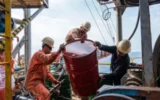
The Director of Energy Consumption Optimization at the National Petrochemical Company announced that the petrochemical industry has succeeded in saving 1.7 billion cubic meters of natural gas in the past four years by implementing optimization projects, and said: "Achieving annual savings of more than 200 million cubic meters has also been targeted for this year."

The governor of Tehran, emphasizing that no diesel fuel is burned in this province, said: "There are about 4 million 200 thousand active motorcycles in the capital, more than 70 percent of which are over 20 years old and are mostly worn out and polluting."

During the cold months of the year, 120 million cubic meters of gas are burned in Tehran daily, which results in the production of 270,000 tons of smoke and the destruction of 400,000 tons of oxygen in the air. Incomplete combustion of gas has led to the release of toxic and deadly CO gas and various diseases and silent deaths.

Referring to the establishment of the Energy Optimization and Strategic Management Organization, the Minister of Oil said: "This new institution will operate in conjunction with the Fuel Consumption Optimization Organization, and the mission of the Ministry of Oil will remain the production and export of oil and gas."

Two decades after the introduction of CNG; the share of this clean fuel is still 11 percent. Nearly two decades have passed since the official introduction of CNG into the country's fuel basket, but this clean fuel has not been able to account for more than 11 percent of the transportation sector's fuel consumption; while official statistics indicate a huge saving of 110 billion liters of gasoline due to the use of CNG.

The memorandum of understanding to establish a joint venture to supply a 300-megawatt power plant between Iran's methanol giant and the country's largest utility company was signed at the Zagros Petrochemical Complex with the support of Dr. Shariatmadari, CEO of Persian Gulf Holding, and in the presence of Dr. Abbaszadeh, Deputy Minister of Oil and CEO of the National Petrochemical Company.

According to data from Kepler cited by Bloomberg, a drop in China's oil imports from Iran has caused the volume of Iranian oil stored in tankers at sea to reach its highest level in two and a half years.

A knowledge-based company has succeeded in building the first Iranian 200-megawatt rotor weighing 53 tons, which is considered a milestone in the localization of the country's power plant equipment and eliminates dependence on the supply of exclusive foreign parts.

On the eve of winter and increased gas restrictions, the electricity industry has announced that only 14 power plants in the country are allowed to use diesel fuel, and this year, low-sulfur fuel has been made available to boiler units; a move aimed at reducing environmental concerns and ensuring a stable supply of electricity during the cold days of the year.

The CEO of the National Iranian Gas Company said: "The amount of gas delivered to power plants in November and the early days of December was much higher than the agreed plan."










